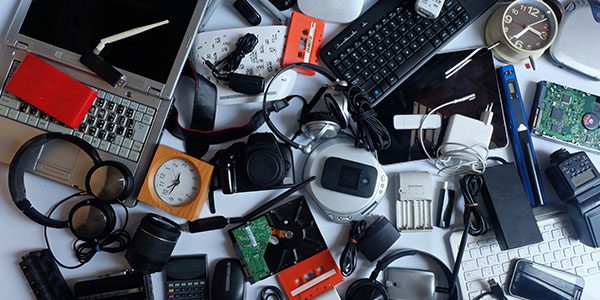Eco-Friendly Electronics Recycling Solutions: Depend On the R2 Certification Criterion
Eco-Friendly Electronics Recycling Solutions: Depend On the R2 Certification Criterion
Blog Article
Master the Requirements of R2 Qualification to Ensure Sustainable Organization Practices
At the forefront of this movement is the R2 certification, an extensive criterion that establishes the bar high for electronic devices recyclers and refurbishers. As businesses strive to straighten with environmentally mindful practices, understanding the demands of R2 accreditation is critical. In a world where sustainability is no longer a plain buzzword but a service critical, diving into the complexities of R2 qualification is a calculated action that can lead the way for long-term success and positive environmental influence.
Relevance of R2 Accreditation
Attaining R2 Qualification is important for services aiming to show their commitment to lasting and liable digital waste monitoring practices. This certification, established by SERI (Sustainable Electronics Recycling International), sets the requirement for liable recycling methods in the electronic devices sector. By getting R2 Qualification, services signal to their stakeholders that they abide by stringent environmental, wellness, and security laws while handling digital waste.
One of the essential reasons why R2 Qualification is essential is its focus on sustainability. With electronic waste being a substantial global problem, companies require to display their dedication to minimizing the environmental impact of their procedures. R2 Accreditation calls for firms to carry out processes that ensure the correct handling, refurbishment, and recycling of electronic waste, therefore adding to the circular economic climate and reducing the accumulation of e-waste in garbage dumps.
Furthermore, R2 Accreditation enhances a business's reputation and credibility. In today's ecologically conscious market, companions and consumers are progressively wanting to team up with companies that prioritize sustainability. By achieving R2 Certification, companies can identify themselves as leaders in accountable e-waste administration, acquiring an affordable side and drawing in like-minded stakeholders.
Key Elements of R2 Specifications

Steps to Get R2 Accreditation
To qualify for R2 Certification, companies have to meticulously demonstrate conformity with a collection of rigid standards and guidelines. The process of acquiring R2 Qualification involves a number of key steps. The very first action is to acquaint oneself with the R2 Criterion and its requirements. This includes comprehending the concepts of liable recycling, information security, environmental security, and employee health and wellness that create the foundation of the accreditation.
Next, organizations need to analyze their present techniques and processes to recognize any type of voids that need to be addressed to fulfill the R2 Standard. This might entail executing brand-new procedures, buying training programs, or making adjustments to existing procedures. When any deficiencies are treated, organizations can proceed to develop a thorough administration system that straightens with the R2 requirements.
Following the application of the essential modifications, organizations should go through a third-party audit to validate their conformity with the R2 Standard (r2 certification). This audit anchor is performed by an accredited accreditation body and consists of a comprehensive evaluation of the company's centers, procedures, see here now and paperwork. Upon effective conclusion of the audit, organizations can receive their R2 Certification, demonstrating their dedication to responsible and sustainable business practices
Benefits of R2 Conformity
Organizations that adhere to R2 conformity requirements can unlock a myriad of benefits in today's sustainable service landscape. Additionally, R2 compliance advertises ecological sustainability by guaranteeing that digital waste is taken care of in an ecologically pleasant fashion, reducing the effect on land fills and all-natural resources. In general, accomplishing R2 conformity not just helps companies fulfill governing needs yet likewise promotes a culture of environmental obligation and functional quality.
Preserving R2 Accreditation
Showing an ongoing dedication to accountable electronic waste monitoring methods, companies need to concentrate on the thorough procedure of maintaining R2 certification. Keeping R2 qualification involves regular audits, internal reviews, and continuous improvement efforts to guarantee compliance with the strict demands stated by the Accountable Recycling Practices (R2) standard. Organizations should stay attentive in checking their electronic waste administration processes, data safety procedures, and overall ecological efficiency to promote their R2 accreditation standing.
Normal training and education and learning for employees are necessary to preserve R2 certification, as personnel require to be knowledgeable regarding the most recent best practices and sector requirements. Keeping comprehensive records and documentation of digital waste recycling activities, downstream suppliers, and interior processes is important for demonstrating compliance throughout audits.
Additionally, organizations must actively involve with their supply chain companions and vendors to ensure that all entities associated with the electronic waste monitoring process abide by R2 criteria. By fostering a society of openness, responsibility, and continuous renovation, services can successfully keep their R2 accreditation and promote their commitment to sustainable organization methods.
Verdict
/cdn.vox-cdn.com/uploads/chorus_image/image/63699193/recycle.0.1549465291.0.png)
Achieving R2 Certification is crucial for businesses intending to demonstrate their dedication to lasting and liable electronic waste monitoring methods. By obtaining R2 Qualification, companies signal to their stakeholders that they adhere to rigorous environmental, health, and safety and security policies while managing digital waste.
Upon successful conclusion of the audit, companies can obtain their R2 Accreditation, demonstrating their commitment to responsible and sustainable business methods.
Maintaining R2 accreditation entails routine audits, inner reviews, and continual improvement initiatives to ensure compliance with the rigorous demands established forth by the Responsible Recycling Practices (R2) standard. By understanding the essential parts of R2 standards, taking the needed actions to acquire accreditation, and gaining the advantages of R2 conformity, businesses can show their commitment to accountable electronic waste monitoring.
Report this page